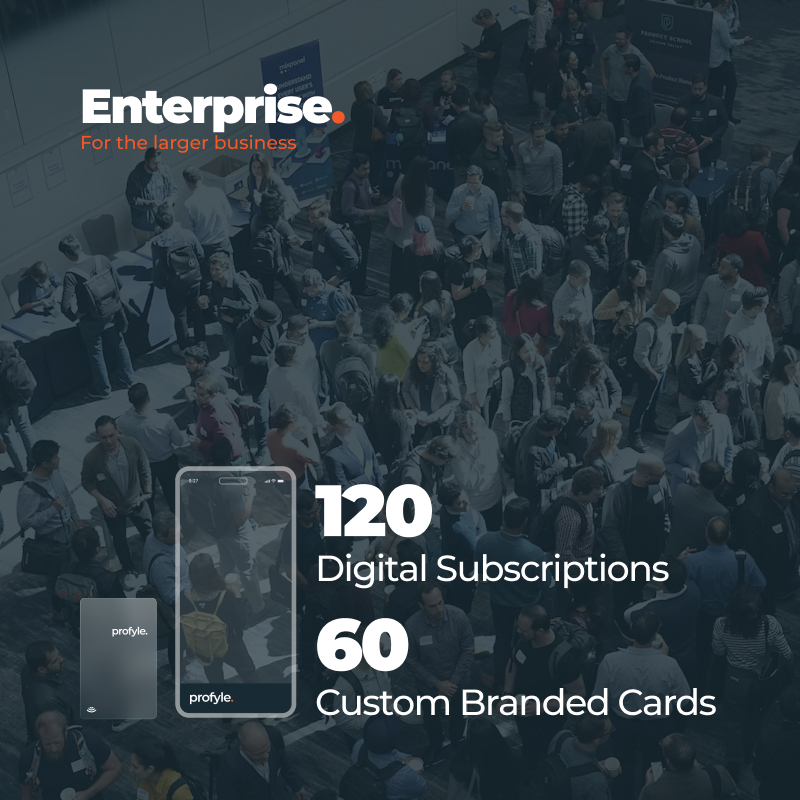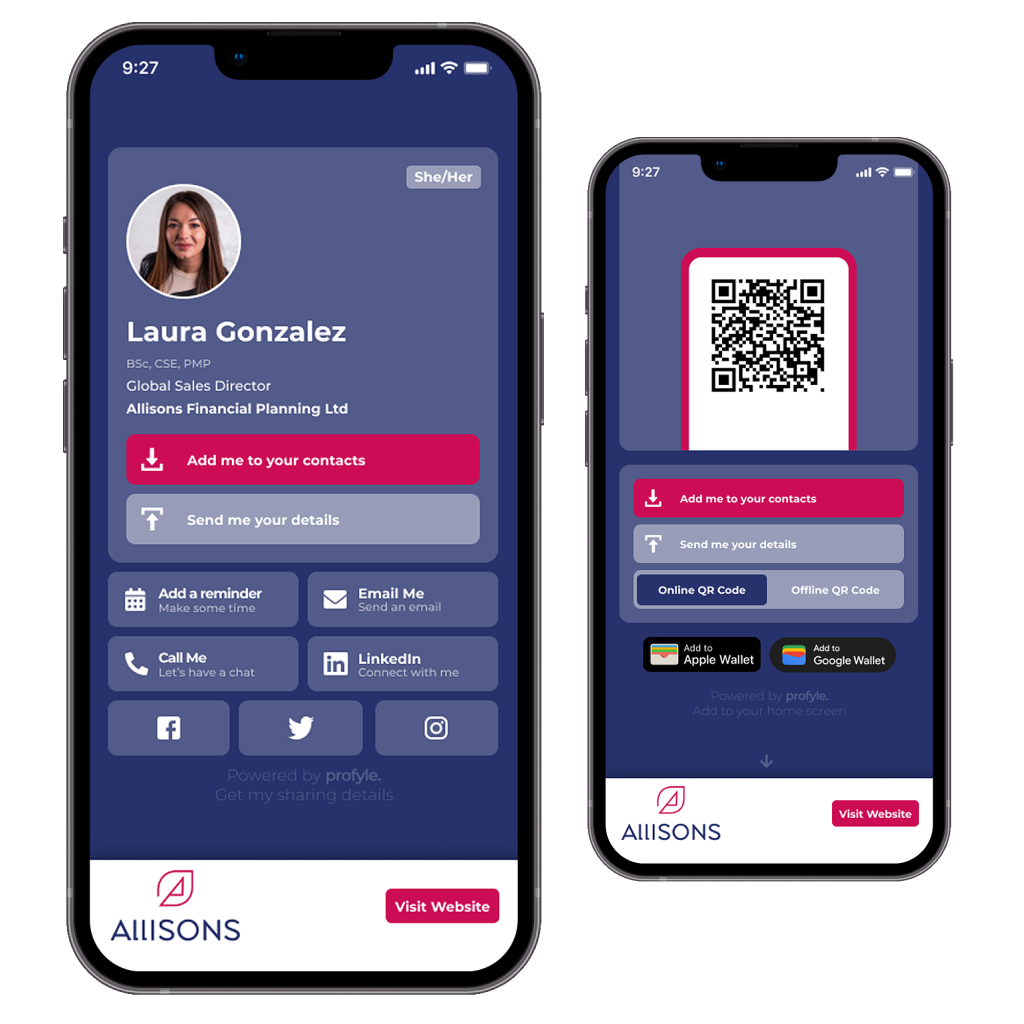You meet someone smart. You shake hands. You say your name. They say theirs. Ten minutes later, you’ve both forgotten. A situation you could easily avoid with NFC business cards, but happens far too often.
Why you need a NFC business card
You’re not alone. Studies suggest people forget names within moments of an introduction, especially in group settings. A survey shared in Psychology Today found that 85% of adults struggle to recall names soon after a conversation. And if you think saving someone in your phone will help, think again. Most of us already have hundreds of names and numbers stored. But when we need to follow up, we don’t even remember who’s who.
Our minds aren’t built to juggle it all. British anthropologist Robin Dunbar famously found that people can manage only around 150 social connections at once. That’s it. After that, names blur. Context fades. Missed chances pile up.
That’s why many professionals are switching to NFC business cards. They don’t just help you stay remembered. They help people remember you the right way.

Want to see how Profyle NFC business cards would work for your team? We’ll walk you through it, no pressure. You’ll be talking to real people. Drop us a line here.
What Are NFC Business Cards?
NFC business cards are smart cards that let you share your contact details with a quick tap.
They have a tiny chip inside that talks to phones when held close. No app is needed. No battery either.
When someone taps your NFC business card, their phone opens a page with your name, number, email, links, and anything else you’ve added. It feels fast and personal, like saying “Here’s everything you need” without saying a word.
Most NFC business cards, like Profyle’s, also include a QR code on the back. That way, even if someone’s phone doesn’t support NFC, they can still scan and connect.
So instead of handing out old-fashioned paper cards that often get lost or binned, you give one smart card that always stays up to date.
NFC business cards tap into what people actually need. Not another slip of paper. Not a fiddly app. Just a quick, clean way to swap details with a tap.
How Profyle NFC Business Cards Work
Profyle doesn’t just give you a card. We give you three ways to share, and you can use all three at once. Let’s break it down.

1. The Physical NFC Business Card
This is the one you hold. It looks sharp. It feels premium. It has a tiny NFC chip inside. Tap it to someone’s phone and your digital profile pops up. That’s it. It also has a QR code on the back, so even if someone’s phone doesn’t support NFC, they can just scan instead.
You only need one card. You don’t print new ones every time your job title changes or your number does. You update it online and the card still works. That’s the point. Tap once. Done.
2. The Digital Business Card
Every Profyle account includes a digital business card. It works like a mini website. You can send the link in a text, email or even drop it in a Zoom chat.
No physical card needed for this bit. Just your phone. You can even save it to your Apple Wallet or Google Wallet, like a boarding pass. Then when someone asks for your details, you just open your wallet and show the code. They scan and get your profile. No taps. No paper. No fuss.
3. Using Your Phone’s NFC
Don’t want to carry a card? You can also use your phone as the card. Profyle lets you trigger your digital card through your phone’s own NFC chip, using something called “Tap to Share.” You tap their phone, your profile appears.
No extra apps. Just one link. One profile. And the choice to share it your way.
So what’s the takeaway?
- You can choose just the digital card.
- You can add the physical NFC card if you want something tactile.
- You can tap your phone if that feels smoother.
It’s flexible, and it works however you work. That’s why Profyle NFC business cards are so popular, they make it easier to connect without locking you into one way of doing things.

How NFC Business Cards Work and Safety
Your phone has more tech in it than the first rocket to the Moon. But when someone taps their NFC card to it and your screen lights up, it still feels like magic.
Here’s what’s really happening.
An NFC business card has a tiny chip inside. It’s passive, which means it doesn’t need power. When the card comes close to a phone with NFC turned on, the phone sends out a quick pulse of energy. That wakes the chip. Then, the chip sends back a tiny bit of data, usually a link. That link might open a contact profile, a website, or a digital business card.
No wires. No apps. No logins. Just tap and share.
Now, let’s talk about what makes this useful. A normal paper card shows your name and number. But an NFC business card can link to:
-
Your full digital profile
-
Social links and email
-
Videos or product demos
-
Files like brochures or PDFs
-
A pre-filled calendar invite
-
A download button for your vCard
Once it’s set up, you can change the link or page any time. But the card stays the same. No reprinting. No typos locked in ink.
Profyle’s NFC business cards take this one step further. Their cards work on both iPhone and Android. And for phones without NFC, there’s a backup QR code right on the card.
That means it always works. No awkward pauses. No “what app do I need for this?” confusion. Just tap, scan, done.
But is it safe? Really safe?
Let’s face it. Contactless anything can feel a bit risky. But NFC business cards are actually much safer than you’d think.
Here’s why:
-
Short range: You need to hold the card within a few centimetres of the phone. No one’s grabbing your data from across the room.
-
No sensitive data: The chip doesn’t store your phone number or email directly. It just holds a link. The full data sits on a secure page like your Profyle profile.
-
No tracking: Unlike some apps or beacons, the card doesn’t follow people around. It only “speaks” when tapped.
-
No batteries: There’s nothing to hack. No Bluetooth. No connection that stays open.
If someone finds your card, they can only see what you chose to share publicly. And you can change or deactivate the link any time.
That’s why NFC business cards are trusted by big brands, startups, and freelancers alike. They keep things simple, smart, and secure.

Want to try it for yourself? Profyle offers a free account to get started. Tap the link, set up your digital profile, and test what a smart contact card really feels like. Sign up for free
Understanding NFC: What It Is & How It Differs from RFID
A train ticket. A contactless payment. A door that opens when you tap your badge. You’ve already used NFC without thinking twice. That same little signal is what makes NFC business cards tick.
So, what is NFC?
NFC stands for near field communication. It’s a short‑range wireless technology that lets two devices exchange data when they’re just a few centimetres apart. NFC chips don’t need batteries. They’re powered by the phone’s signal when you tap. That means they’re always ready.
Now here’s where it gets more interesting.
Many people mix up NFC and RFID. They’re like cousins. RFID stands for radio frequency identification. It’s been around longer and is often used in warehouses or ID badges. But RFID is usually one‑way. The chip sends a signal to a scanner, and that’s it.
NFC is different. It can talk both ways. You tap a card to a phone, and the phone opens a page, sends back a request or shows more options. That’s why NFC business cards feel smooth. They’re not just sending info. They’re starting a conversation.
Let’s break it down simply:
| Feature |
RFID |
NFC |
| Range |
Long (up to several metres) |
Short (up to 4 cm) |
| Direction |
Usually one‑way |
Two‑way communication |
| Use cases |
Warehouses, ID tags |
Phones, cards, payments, business cards |
| Power source |
Often needs batteries |
Passive (powered by phone tap) |
What matters here is how NFC business cards use this two‑way signal to do more than just drop your contact info. They open your profile. They link to your website. They can even start a calendar invite. It feels personal, even if it’s shared in seconds.
That’s why businesses like Profyle built their cards on NFC, not RFID. RFID might be fine for tracking boxes. But you’re not a box. You’re a person.

Are NFC Business Cards Worth It? (Benefits and Drawbacks)
A box of paper cards costs less than lunch. But how many do you still use after a month?
That’s the thing. Cheap doesn’t always mean useful. Most people either bin paper cards or leave them in a drawer. Then when they need to follow up, they search LinkedIn instead.
NFC business cards flip that.
You hand over one card, not fifty. It never runs out. And it sends people straight to your profile, ready to call, email, or book a meeting.
But let’s take a closer look. What do you really get? And is it worth the cost?
Why NFC Business Cards Pay Off Fast
1. You only need one.
One card. One setup. Used hundreds of times. It works at every event, meeting, or intro. And with Profyle, you can update your info anytime. It’s all online.
2. You look sharper.
Handing over a Profyle NFC card shows you’re ready. The card opens a smart, polished profile with your links, contact details, and extras like video or files. That first tap feels like a fresh handshake.
3. You stop wasting money.
No more reprints. No boxes of old paper cards in your office drawer. One reusable card that never goes out of date.
4. You go green without trying.
Less waste. Less shipping. No need to print hundreds of cards that get binned after a week. It’s one of the simplest ways to make your team more sustainable.
Frequently Asked Questions About NFC Business Cards
What are NFC business cards?
NFC business cards are plastic or metal cards that have a small chip inside. NFC stands for Near Field Communication. When you tap the card against a phone that supports NFC, it opens a digital profile, like a contact page or mini website.
Profyle NFC business cards come with both the smart chip and a printed QR code. So they work on almost every modern phone, Apple or Android, even if the person doesn’t have NFC turned on.
These cards don’t store personal data directly. They carry a link to your profile, which is hosted securely online. That’s why they’re easy to update without needing to change the card.
How do NFC business cards work?
NFC business cards work using the same type of short-range tech used in contactless payments. The chip inside your card sends a small bit of data (a link) when held close to another NFC-enabled device.
Here’s how it works step by step:
-
The card has an NFC chip inside
-
You hold it near someone’s phone (within 1–2 cm)
-
The phone picks up the chip’s signal
-
It opens the web link stored on the chip
-
That link takes them to your digital profile
Profyle lets you change that profile whenever you like, no tech skills needed. This is one reason why NFC business cards are growing fast among consultants, founders, marketers, and sales teams.
Are NFC business cards safe?
Yes. NFC business cards are safe to use and don’t store personal data directly on the chip. All they do is send a link when tapped. That link opens a secure web page that you control.
NFC chips only work within very short distances, around 1–2 inches, so no one can scan them secretly from across the room. Plus, your Profyle account is password-protected and hosted on encrypted servers.
Because you can update your profile at any time, you don’t risk sharing outdated or incorrect details, which helps protect your brand and reputation too.
Can I use my phone as an NFC business card?
Yes. If your phone supports NFC (and most modern smartphones do), you can use it to share your digital card directly, no need to carry a physical card.
With Profyle, you can enable “Tap to Share” from your profile. Then your phone acts just like an NFC card. Tap someone else’s phone, and it brings up your contact page.
This is handy if you’ve forgotten your card or prefer to keep things fully digital. You can also save your card to Apple Wallet or Google Wallet for easy access.
Do NFC business cards work without internet?
Sort of. The NFC chip itself doesn’t need internet to send the link. But the phone that scans it needs to be online to open the link and view your profile.
So, if someone taps your card and their phone is offline, they’ll see a “No connection” message. But once they’re back online, the link will work again, as long as they didn’t clear their browser or cache.
Profyle cards also include QR codes, which work the same way. Again, the phone needs a signal or Wi-Fi to load your info.
What is the difference between NFC and RFID?
NFC and RFID are both types of short-range wireless tech, but they’re used for different things.
-
RFID (Radio Frequency ID) can work over longer distances and is often used in ID badges, security gates, and warehouses.
-
NFC (Near Field Communication) is more private and works only at short range, usually under 4 cm. It’s safer for sharing links and used in things like contactless cards and digital wallets.
NFC is actually a special type of RFID — but it’s slower and more secure by design. That’s what makes it ideal for business cards.
How do I create an NFC business card?
It’s easier than you’d think — especially with Profyle:
-
Sign up free at profylecard.com
-
Fill in your digital profile — name, job, phone, links, logo, etc.
-
Choose your card style (Lite, Pro, or custom for teams)
-
Place your order and get the physical card in the post
-
Tap to share, or just send your profile link
You can start sharing the digital card right away, even before your physical NFC business card arrives.
Are NFC business cards worth it?
Yes, for most professionals, nfc business cards are worth the cost, especially when you look beyond the price tag and think about lifetime use.
Here’s why:
-
One-time purchase, reusable forever
-
Easy to update without reprints
-
Saves money in the long run
-
Works better at networking events
-
Looks more polished than paper
-
Better for the environment
With Profyle’s pricing starting at £7.95, it’s cheaper than a box of premium print cards, and a lot more useful.
Can I get a free NFC business card?
You can start free with Profyle’s digital card. That means you get your online profile, QR code, and wallet share options with no payment needed.
If you want a physical NFC business card, prices start from just £7.95 (Lite Card) or £24.95 (fully brandable Pro Card). No hidden fees. No ongoing costs unless you add extras.
It’s a great way to try before you invest in cards for your whole team.
What’s the best NFC business card?
If you want something that works across devices, looks smart, and gives you full control, Profyle is a top choice.
Here’s what makes it stand out:
-
Clear, no-surprise pricing
-
Digital + physical NFC options
-
Apple Wallet and Google Wallet integration
-
Built for both solo users and teams
-
Free plan to get started
You can read real reviews at profylecard.com/reviews, or talk to their sales team to learn more.
What are NFC business cards worth?
In simple terms: they’re worth it if you meet people often, want to be remembered, and don’t enjoy wasting money on paper.
For about the price of two lunches, you get:
With Profyle, you also get support, free updates, and a personal dashboard to manage everything.

























